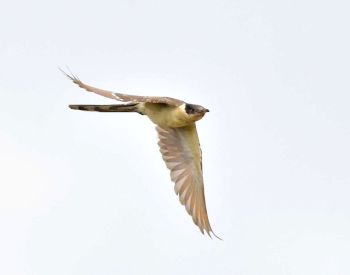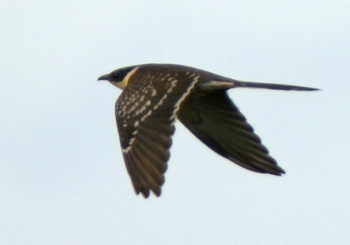- Clamator glandarius
Identification
35–39 cm (13¾-15¼ in). Tail long and wedge-shaped.
Adult:
- Pale silvery-grey crown and crest
- Upperparts are grey with an abundance of white spots
- Chin and throat are yellowy-white
- Belly creamy-white
Juvenile:
- Black on upperparts where adult is grey
- Rufous on primaries
Distribution
Europe, Middle East and Africa:
In Africa resident breeder from just south of the Sahara to Zambia and Mozambique (avoiding areas with rainforest); summer migrant to Southern Africa.
In Middle East summer migrant to Turkey, Iraq, Iran, Israel, and Egypt.
In Europe summer visitor to Spain, Portugal, southern France, Italy, and eastern Greece.
Vagrants occasionally venture elsewhere in Europe, including the British Isles.
Taxonomy
This is a monotypic species[1].
Habitat
Breeds in heathland with occasional trees, Cork Oak Quercus suber being a favourite in Iberia. Also Olive Olea europaea groves.
Behaviour
Flight
Direct flight, much stronger than Common Cuckoo. The trailing tail makes the outline distinctive.
Adopts Eurasian Magpie-like postures during the breeding season.
Hops on the ground
Diet
It's diet consists mainly of insects.
Breeding
It parasitises nests of the crow family (in Europe mainly the two species of magpies), and may lay several eggs in the same nest. In southern Africa the most common hosts are Pied Crow, Cape Crow and Pied Starling. In western Europe is a very early breeder, the adults have left the region by early June.
Vocalisation
References
- Clements, J. F., T. S. Schulenberg, M. J. Iliff, D. Roberson, T. A. Fredericks, B. L. Sullivan, and C. L. Wood. 2018. The eBird/Clements checklist of birds of the world: v2018. Downloaded from http://www.birds.cornell.edu/clementschecklist/download/
- Birds of Kenya
- Collins Field Guide 5th Edition
- Collins Bird Guide ISBN 0 00 219728 6
- Beaman, M., S. Madge, K.M. Olsen. 1998. Fuglene i Europa, Nordafrika og Mellemøsten. Copenhagen, Denmark: Gads Forlag, ISBN 87-12-02276-4
- Birdlife International datazone
Recommended Citation
- BirdForum Opus contributors. (2025) Great Spotted Cuckoo. In: BirdForum, the forum for wild birds and birding. Retrieved 28 April 2025 from https://www.birdforum.net/opus/Great_Spotted_Cuckoo
External Links
GSearch checked for 2020 platform.1







